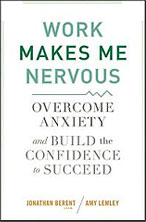Create your Diagnostic “Map”: Quick Start
Take this quick profile to determine if you have a public speaking anxiety disorder. As a starting point, I suggest that you consider the reality that when avoidance of the threatening speaking event is occurring, a phobia is present. Anxiety is fear. When fear evolves into avoidance a phobia is present. Glossophobia is the phobia of public speaking. Check which of the following apply to you. You should see an emerging pattern.
- Obsessing or ruminating about an upcoming speaking scenario.
- Worrying about public speaking impacts your mood negatively during your personal time.
- Obsessing or ruminating after a speaking scenario with a negative internal script.
- Fear of being noticeably nervous.
- Fear that when you are noticeably nervous people will see “who you really are”.
- Fear of panic during speaking.
- Once you have experienced a negative adrenaline-panic episode obsessing that it will occur again.
- Sustained rationalizing and manipulating to avoid public speaking.
- Dependence on substances (prescribed or otherwise) to negotiate public speaking.
- The last thing you want to do is to work on how your emotions are related to the anxiety. You want a quick and easy fix.
- You keep putting off getting help for the problem.
- You have compensated for your avoidance of public speaking by being competent with your technical skills.
- You have considered a different job/career due to the public speaking fear.
- Entering a public speaking scenario with an over-prepared script.
- Spontaneous questions rattle you.
- You are a “perfectionist”
Now; imagine that your public speaking anxiety was resolved. How would life be different? Seriously; think about it carefully!
If you want evidence regarding how life can change for the better go to the public speaking anxiety interviews at our free clinical library. If you listen carefully you will not only hear testimonials, but will gain insight into the healing process.
I wish you a “high performance mind”,
Jonathan Berent, L.C.S.W.
Self-Help and Treatment Options
- Free Audio CD from Social-Anxiety.com
- Social Anxiety: The Untold Story
- Beyond Shyness: How To Conquer Social Anxieties
- Work Makes Me Nervous
- Comprehensive Self-Therapy Audio Program
- Public Speaking Anxiety Self-Therapy Audio Program
- “Warm Hands Cool Face” A Self-Help Clinical Program for Blushing Anxiety & Erythrophobia
- The Berent Method: High Performance Therapy for Social-Anxiety
- Telephone/skype therapy available worldwide
- Selective Mutism Seminar Audio CD/MP3 Program
- Self-Help Program for Parents of Children with Selective Mutism
- The Sociability Questionnaire
- Tip of the Month Club
- Social Therapy and The Learning Disabled
- Free Parent Addiction Survey


